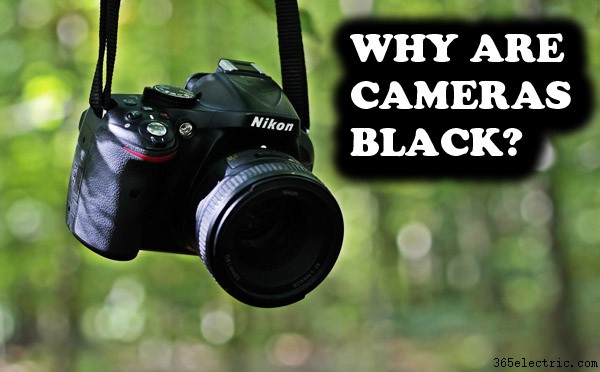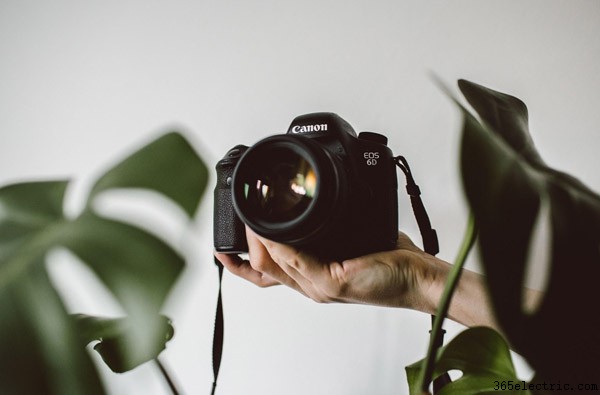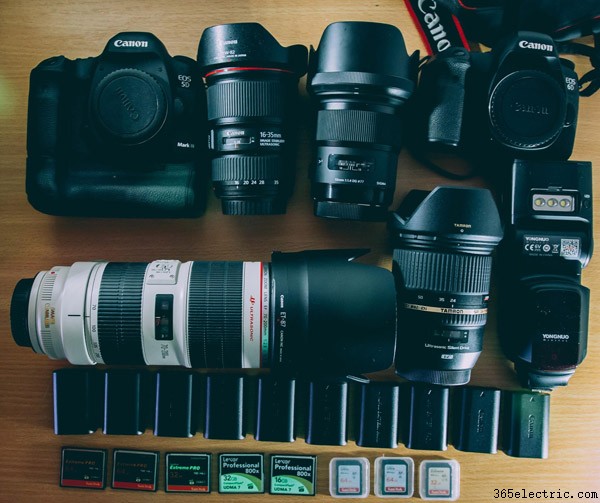Guía de colores de la cámara:por qué las cámaras son negras
¿De qué color es tu cámara?
¿Alguna vez has prestado atención al color de las cámaras DSLR? Eche un vistazo en la bolsa de un fotógrafo de bodas, o mire el mar de fotógrafos en una conferencia de prensa o evento deportivo y notará que la mayoría (o todas) sus cámaras son de un solo color:negro. Sigue buscando y notarás que la mayoría de sus equipos también son negros.
¿Porqué es eso? ¿Hay algún motivo por el que la mayoría de las cámaras DSLR sean negras?

Como ocurre con la mayoría de las cosas en fotografía, sí, hay una razón por la cual el negro es el color elegido para el cuerpo de la cámara. Siga leyendo para averiguar por qué.
No solo se ve más profesional, sino que también los cuerpos y equipos de cámara negros ayudan a reducir los reflejos y el tono de color de la cámara en los objetos cercanos. Además, las cámaras de colores brillantes pueden distraer tanto al fotógrafo como al sujeto. Pero hay muchas más razones de las que crees para esta elección de color.
¿Por qué las cámaras DSLR son negras?
Las cámaras de apuntar y disparar vienen en una amplia gama de colores, incluidos azul, verde, rojo, rosa, morado y más. Los DLSR, sin embargo, son principalmente negros. Por supuesto, puedes encontrar modelos de color carbón, así como modelos negros y plateados como esta Pentax KP. También encontrarás algunas DSLR blancas extrañas como esta Canon EOS Rebel SL3 e incluso un cuerpo rojo sexy como esta Nikon D5300.
Sin embargo, la gran mayoría de ellos son negros.
¿Hay alguna razón para esto? En realidad, hay varios. Veámoslos aquí.
Las cámaras negras se ven más profesionales
Imagina aparecer para fotografiar una boda con una cámara de color amarillo brillante. You’re bustling about, working hard to get the quality images your client is expecting when you hear someone yell out, “where’s the photographer? We need a photo!”
You start looking around to see where the photo emergency is happening and then you hear the reply. “Just look for the second sun, that’s the photographer!” Followed by a chorus of laughter.
You can make whatever you like of the comment, but the fact of the matter is that brightly colored cameras just don’t seem as professional. They stir up memories of those oversized plastic cameras you might have played with as a kid and just seem more cheaply made.
But why is that? Is there a legitimate reason why we associate black cameras with professionalism? Perhaps camera manufacturers all got together and decided that black meant professional cameras and so that’s what they made. Now, after so many years of seeing professionals use black cameras, it has been pounded into our brains and we perceive black as professional as well.
Well, not exactly. Just think about that bright yellow camera we just mentioned.
There are a few other reasons why black cameras have been used more often by professional photographers and thus have come to be perceived as “professional”. Let’s keep digging.
Black Cameras Have a Lower Profile
Photographers often don’t want to draw too much attention to themselves.
For example, wedding photographers can be seen dodging guests and popping out from behind columns or decorations to photograph their clients somewhat surreptitiously. People often feel uncomfortable with a camera in their faces, so in order to capture genuine, heartfelt emotions from the day, photographers look for ways to minimize the intrusion of the camera. Additionally, candid shots during the reception often turn into favorite wedding photos, but they are hard to get with a camera that screams for attention.
But it isn’t just wedding photographers. Street photographers, photojournalists, and even portrait photographers don’t always want to be noticed by their subject.
As another example, hiring a photographer for a surprise proposal is common these days. However, a photographer who shows up with a hot pink camera may be slightly more noticeable than one with a more modest black one.
In the event that you want to draw your subject’s attention (such as a toddler’s portrait session), you can always hold up a colorful object and dance around like a crazy person. However, the reverse (toning down a bright camera) is more difficult.

Reflections Are a Concern
Particularly in a studio setting because of the artificial lighting, reflections can be a big problem. This is most concerning when you are trying to photograph a shiny or reflective object like glass or metal. A shiny or reflective camera can easily create unwanted reflections in your subject.
It is for this same reason that most photography equipment like light stands, tripods, etc., are also black. If their type of photography requires it, some photographers will even go so far as to black out any white lettering from the camera’s name on the front of their camera. This might be extreme for many photographers, but illustrates the point of how careful you may have to be to avoid reflections.
Interested in learning more about how to light a reflective object in the studio? Check out this quick tutorial by a scientific photographer professor Gale Spring at RMIT University in Melbourne, Australia.
A Bright-Colored Camera Could Cast Color onto a Near Object
It’s important to remember that a camera is a tool, not a fashion accessory. A flashy metallic blue camera body might seem like a fun idea until you start to realize that the blue color shows up reflected in some of your photos.
Of course, it will only be a problem at short distances, such as those used for macro photography, some types of product photography, and the like. However, if you realize that it is a problem in your photos, what are you going to do?
You either have to buy a cover for your camera or sell it and get a new (black) one. To avoid this altogether, most professional photographers stick with the tried and true black models.
Bright/Shiny Colors Could Distract/Scare the Subject
In some types of photography, a flashy camera could actually scare off your subject. For example, wildlife photographers probably won’t have much luck if they bring a brightly-colored camera to the jungle. Bright colors in the jungle typically mean “stay away! I’m poisonous!” potentially prompting your subjects to run or hide.
So, if you show up with a bright-colored camera, you might have a really hard time pinning down your subject. Since wildlife is often hard to pin down anyway, you don’t want to make it worse on yourself.
Think this is an extreme example?
Many of Canon’s L-Series telephoto lenses are white and nature photographers often use a camo cover to help them blend into the background better.
Furthermore, a bright-colored camera might even be counterproductive with human subjects. Bright colors are more distracting than black and can interfere with your subject’s concentration.

A Bright-Colored Camera Could Throw Off the Photographer’s Eye
Bright colors can affect more than just the subject — they can affect the photographer too. Of course, you’re unlikely to get scared or distracted by your own camera because you’re used to it. But a bright color could still be a problem.
For example, the color cast of the camera might show up in what you see when you look through the viewfinder. This will make it difficult to correctly choose settings such as white balance.
Black Is the Cheapest/Easiest Paint to Use
Henry Ford started out only making black cars because it was the cheapest option. Not only was black paint cheaper to produce but also it was easier and faster to paint all the cars the same color.
Even though manufacturing has advanced considerably since the early 1900s, this principle still applies. The cost difference may be negligible considering that you’re already spending hundreds of dollars, but anything that helps keep the price down is appreciated.
Looking Like a Professional
Just as you want to look like a professional by carrying professional-looking equipment, camera companies want professionals to take their gear seriously. Those sleek red Nikons might be pretty flashy, but really they only appeal to a small subset of photographers — and not those likely to spend thousands of dollars on a camera.
After all, the problems with reflections and distractions we mentioned are not something professionals want to deal with. Not to mention a brightly-colored camera, regardless of the shade it sports, just won’t be taken as seriously by clients and other people.
Interested to learn more random facts about cameras? Feel free to check out more of our articles. To get you started, click here to learn if disposable cameras are any good.
- ·¿Por qué están las imágenes Negro en Mi iPhone
- ·Son Electric- Zoom propensos a los daños
- ·Guía para la cámara bajo el agua del sistema de Equipos
- ·Cámaras que se puede unir a Sombreros
- ·¿Cuántos tipos de cámaras están allí
- ·¿Cuáles son las cámaras del CCTV
- ·¿Qué cámaras se utilizan para filmar películas
- ·¿Por qué son los lados Negro en algunos canales HD
- ¿Qué cámaras se utilizan para filmar películas
- ¿Cuáles son las ventajas de las cámaras de seguridad
- Por qué las cámaras sin espejo de Olympus son de primera categoría para la fotografía de viajes
- Guía de la cámara con telémetro:compra, uso y preguntas frecuentes
- ¿Por qué la mayoría de las cámaras se fabrican en Japón?
- ¿Por qué las imágenes están negras en mi iPhone?
